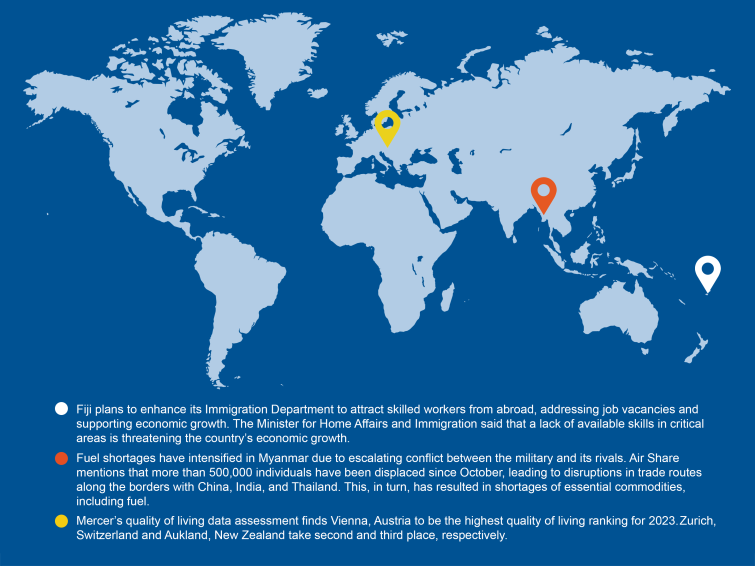Navigating Troubled Waters: The Ripple Effect of Recent Incidents on Global Shipping Through Suez and Panama Canals

Recent attacks on commercial vessels in the Red Sea, despite the presence of the international naval force, Operation Prosperity Guardian, are reshaping global shipping dynamics. Attacks persist, with many vessels targeted since mid-November, escalating tensions. An incident involving a Maersk container vessel prompted an aggressive U.S. response. Most carriers are rerouting away from the Red Sea, causing longer voyages and potential port congestion. Combined with disruptions at the Panama Canal due to drought, global trade faces delays and increased transport costs. Some companies planned Red Sea routes to avoid Panama Canal delays, but the attacks are causing a reevaluation. Rates on major trade lanes have surged, and carriers have introduced surcharges. The situation may impact air cargo, but no significant disruptions have been reported so far.
The Impact: The disruptions in international shipping, like the Red Sea incidents, impact corporate mobility programs in several ways. This includes potential delays and increased costs for shipping household goods. Mobility leaders should work with their relocation management company (RMC) to adjust logistics, communicate updates effectively, enhance risk management, explore alternative transportation options, and collaborate with supply chain partners. An RMC that provides support and education on challenges in international shipping is crucial for managing expectations and ensuring a smooth relocation experience.
Sustainability in Global Mobility
In the white paper “Sustainability in Global Mobility,” Mike Wincott, AIRINC Senior Director, Client Solutions EMEA, discusses the increasing importance of sustainability in the context of global mobility. Wincott explores how global mobility can contribute to sustainability goals, discusses the three pillars of sustainability—Profits, Planet, and People—and outlines four key areas:
- Behavioral Change: Global Mobility can influence vendors globally to adopt environmentally friendly practices, multiplying its sustainability impact.
- Competitive Advantage: Sustainability credentials are crucial in recruitment. Global Mobility can support sustainable employment solutions and align with employees’ sustainability goals.
- Avoiding Greenwashing: Clear goals are essential to avoid portraying mobility programs as sustainable without meaningful practices.
- Reducing Carbon Footprints: Global Mobility leaders should reassess the necessity of assignments, explore remote work options, and incentivize low-impact travel methods.
The Impact: As employees place a growing emphasis on sustainability and express heightened interest in eco-friendly practices, there is an escalating demand for environmentally conscious options in the realm of relocation. It is imperative for organizations to align their mobility services with the company’s values, particularly in the crucial domain of sustainability.
At CapRelo, we strive to make Sustainability central to our business practices. We actively encourage virtual meetings and remote work, prioritize collaboration with vendors who are committed to sustainability, and provide greener transportation options for transferees during relocations to minimize carbon emissions. Partnering with ecolegIT allows clients to offset their moves’ carbon footprint. Teaming up with Home Sweet Home, we offer discard and donate services to reduce packing materials and fuel consumption. We are also currently undertaking an effort to measure our carbon emissions and set reduction targets. For more information on our efforts, check out Our Impact page.
British Columbia Passes Short-Term Rental Regulations Despite Opposition’s Proposed Amendments
According to a Vancouver Sun article, recently approved legislation in British Columbia marks a significant step in the regulation of the short-term rental market across the province. Starting in May 2024, the new law will enforce higher fines for non-compliance and require all short-term rental providers to submit principal residence information to a provincial registry.
The provincial government gave its final approval to the new regulations, asserting its stance on the matter despite proposed amendments from the B.C. United opposition. The rejected amendments aimed to limit the types and quantity of registered accommodations, with exemptions for medical travel, major conferences, and sporting events.
The Impact: About 16,000 whole home units are currently rented out as short-term units in B.C. so this new law could free up several thousands of units for long-term renters. However, these units will not be cheap with some priced as high as $4,000 USD a month for a housing unit. B.C. United leader Kevin Falcon raised concerns about the impact on affordability, noting potential difficulties for various groups, such as nurses, doctors, and the film industry, due to reduced availability of short-term rentals.
As the province moves forward with these regulations, the implications for affordability, accommodation availability during major events, and the broader economic impact on industries like film production will undoubtedly remain subjects of ongoing debate and scrutiny.
Breaking Boundaries: B.C. Unveils Legislation to Facilitate Entry for Global Talent
British Columbia is set to accelerate the entry of internationally trained workers into the labor force by introducing legislation aimed at reducing barriers for skilled professionals. On the Global News, Premier, David Eby highlighted the need to address labor shortages and expressed concerns about complex and frustrating processes that hinder newcomers, including redundant language testing and a “catch-22” requirement for Canadian work experience before accreditation.
The legislation, set to take effect in the summer of 2024, targets 29 professions, including veterinarians, lawyers, teachers, paramedics, architects, and others. The move builds on the government’s efforts to streamline credential recognition, particularly for healthcare workers. The law establishes processing timelines, end duplication in language testing, and enhance transparency in assessment processes. Additionally, it creates a new superintendent to oversee fair credential recognition and compliance enforcement. The legislation covers 18 regulatory authorities.
The Impact: British Columbia’s new legislation aims to ease entry for skilled workers, making it easier for companies doing business in B.C. to acquire and relocate skilled talent. Global assignees who hold a particular skillset and their families may also benefit from B.C.’s legislation—with a more efficient and streamlined process making it easier for them to find work in their industry, with fewer pre-requisites.
Global Mobility Radar
CapRelo’s Mobility Radar provides valuable insights into trends worth monitoring. This month, we have detected important global mobility updates in Fiji, Myanmar, and Austria.



